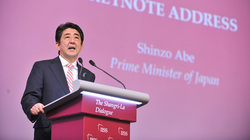 Source: www.iiss.org
Source: www.iiss.org “Peace and prosperity in Asia, forevermore
Japan for the rule of law
Asia for the rule of law
And the rule of law for all of us”
This speech was definitely meant for a Chinese audience, more so than it was meant for the other nations in the region. While Abe did not resort to the same sort of rhetoric adopted by US Defence Secretary Chuck Hagel, who lambasted China for de-stabilising of the region through its unilateral actions, Abe’s reiteration of the necessity of the rule of law along with freedom of navigation and over flight, and his commitment to providing nations within ASEAN with coast guard vessels to protect their EEZ, spelled out what Japan objects to with regard to China’s behaviour and how it intends to counter it.
During his speech, Abe made reference to his attempts to create an agreement with China in 2007 concerning joint mechanisms for avoiding misunderstandings or incidents at sea or in the air, and how these had not eventuated. He also raised the point of how all should engage in dialogue, ‘exchanging smiles’ (although this is probably a little too optimistic). Abe also placed emphasis on the need for the EAS to become the premier multilateral dialogue in the region, which is an interesting statement, especially since it would mean superseding both APEC and the ARF. The EAS, unlike other dialogues (with the exception of the ADMM+) focuses intensely on security discussions, and provides a platform for all major and middle powers of the region to meet and discuss shared concerns. If Japan wanted to play a greater regional role, then the EAS would provide the largest mechanism on which to clarify its intentions and garner support from other nations.
That might become more necessary in future, especially given China’s reaction to what was said during the dialogue. PLA Lieutenant General Wang Guanzhong, Deputy Chief of the General Staff Department of the PLA (why, pray tell, did they not send the chief? A subtle dig at the importance of the Shangri-La dialogue to China, perhaps? or was he dealing with the aftermath of the bombing in Xinjiang last week?) went off script during his speech, accusing Japan and the US of colluding before making their respective speeches, and accused PM Abe of having “overtly or covertly, explicitly or implicitly and directly or indirectly condemned China”. That comment in itself reveals something of Chinese government (or should that be military?) thinking regarding Japanese activity of late. This thinking regards any move by Japan as a threat to China, and so must be vociferously denounced in whatever public forum is available. It is entirely possible that Wang was told to express the views of the military during the dialogue, and that Wang’s segue was to occur should any country question China’s regional activities, particularly if it came from Japan or the US.
It’s this type of rhetoric that has so concerned the region, because the opaque nature of Chinese decision making makes it particularly difficult to tell whether Wang’s speech was meant to placate or inflame regional opinion. If the intention was to placate fears it didn’t, as the message within the speech rang hollow in light of China’s recent actions towards the Philippines and Vietnam. The segue merely added to the concern, for it appeared that this was the real message that China wanted to send to the region, and that the rest of Wang’s speech need not have been made.
Such developments may have helped to spur the speculation in this report from Reuters released late last week, which detailed the possibility of Australia acquiring not merely submarine technology from Japan, but a full fleet of vessels, constructed by Kawasaki and Mitsubishi Heavy Industries. If this is true, and it is unlikely that it is (see p.53 of the Australian Senate Estimates Committee Hansard record for the Department of Defence’s view on this), then it would be an escalation in bilateral dialogue on military technology exchange that surpasses that between Australia and the US, and lays down the foundation of what would be an eventual defence alliance between Australia and Japan. Now that truly would make China hit the roof, and would put the Australian government in a particularly precarious situation. Nonetheless, if there is no belief that China is prepared to negotiate on its territorial claims, and continues to act unilaterally to enforce those claims, then the emergence of alliances from unlikely places may just be a consequence of such action.
 RSS Feed
RSS Feed